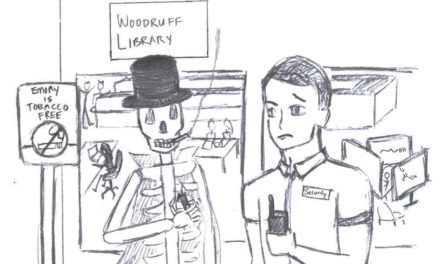
(Courtesy of Wikimedia Commons)
This semester feels like the premise of a really sick scientific experiment. What happens when 7,000 undergraduates are allowed to run amok during a pandemic? What if you don’t require testing for vaccinated students? Vaccines are required, except for people with health problems and “strong personal objections.”
The answer: the Emory Conference Center Hotel (ECCH), which houses positive students, has seen a nearly 500% increase in students in the past week. Student Health Services (SHS) is bombarded with so many symptomatic testing requests that not only can they not accommodate them, but students, such as Danny Roytburg (25C) and Bella Piekut (25C), are also being shipped off to the hotel before receiving test results. With this, some people who aren’t COVID-19 positive are taking hotel rooms away from positive students. Students that book asymptomatic testing appointments are stuck waiting 24 to 48 hours for their results, with no instructions to quarantine. The University has proven inept at protecting its students against COVID-19 and other medical ailments.
Health problems other than COVID-19 still exist, despite the worrying spike in cases. Yet, some students can’t even book in-person appointments for non-respiratory issues at SHS anymore. The Student Health Portal reads that they are experiencing a large number of COVID-19 related visits, thus they have “very limited space available for non-respiratory visits.” The website directs students to nearby Urgent Care clinics instead. The term “limited space,” however, is misguided. After attempting to schedule a Primary Care appointment online, Margaret Hecht (25C) and I both found that there was not a single appointment available within the next few months.
Telehealth and Urgent Care are now the only remaining options for those with non-COVID-19-related concerns. In serious situations, students are directed to Emory University Hospital Emergency Room. Unfortunately, the reality is that Emory is attached to an internationally-renowned hospital but unable to provide students with basic health care, like concussion treatment or stomach pain diagnosis. For a school that gloats endlessly about its mastery of medicine, it’s shocking that its students are now struggling to receive basic care.
Both off-campus partying and the University’s lack of proactivity in testing bear significant responsibility for the spike in COVID-19 cases over the last 10 days. Had Emory tested students upon arrival and isolated positive cases immediately, the number of positive cases might have been different. Perhaps, like Rice University (Tex.), Emory should have taken classes online for two weeks. Though a few unlucky students would have spent the first 10 days of college in the ECCH, the University could have avoided the seemingly uncontrollable surge in positive cases. While it’s difficult to prevent newly independent 18-year-olds from partying, it is possible to isolate COVID-19-positive students through regular testing.
Contact tracing and speedy testing are additional measures Emory must take to squash the surge in positive cases. Emory should increase the number of weekly tests available, invest in tests with quicker results and establish a more logical contact tracing system. Currently, contact tracing often doesn’t function adequately; personally I have only received emails about isolated positive cases in my residence hall, despite being exposed to COVID-19 on two separate occasions.
Furthermore, results from asymptomatic tests can take up to 48 hours to come back, cultivating anxiety and spreading COVID-19. On two separate occasions, my friends and I resorted to buying at-home antigen test kits for quick results after being exposed to COVID-positive individuals. If Emory Village’s barren CVS can provide students with tests, the University with the 22nd best medical school has a duty to provide students and staff with free, quick testing at all times.
Emory’s endowment is in the billions, and the University has the resources and personnel to keep students safe and healthy during a pandemic. While Emory has taken steps like changing its operating status to yellow and advising students to eat outside, nothing will improve until testing is prioritized and contact tracing is performed consistently.
Sophia Peyser (25C) is from New York, NY.
Sophia Peyser (25C) is an environmental science and english + creative writing major from New York City. In addition to managing the Opinion and Editorial Board sections of the Wheel, she works as an intern at Science for Georgia and a radio DJ at WMRE. In her free time, she loves thrifting in remote corners of Atlanta and drinking lavender lattes at Victory Calamity + Coffee.





